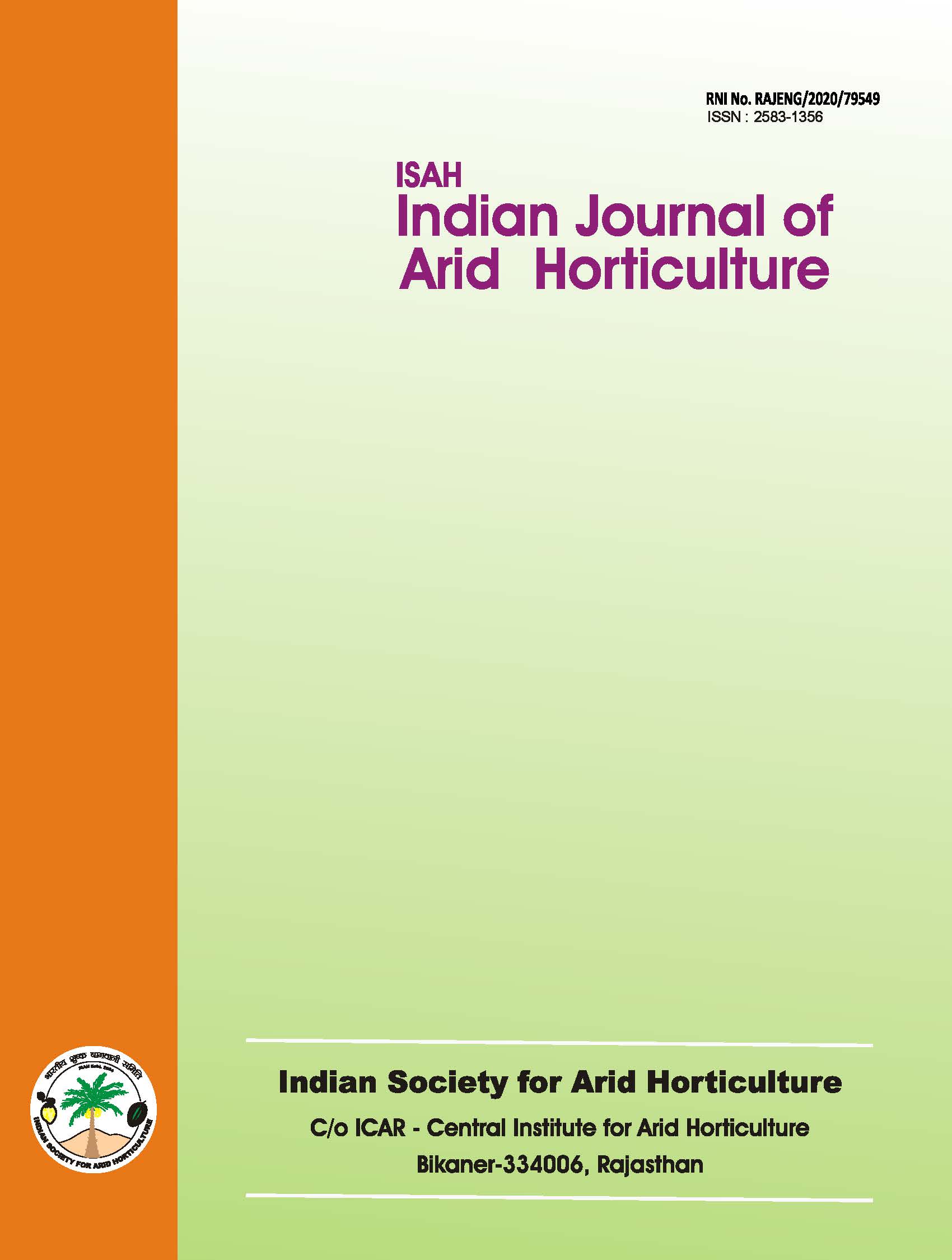Sweet potato (Ipomoea batatas L.): Climate resilient crop for food security in arid and semi-arid regions - A review
DOI:
https://doi.org/10.48165/ijah.2025.7.1.3Keywords:
Sweet potato, drought tolerance, climate resilience, arid regions, crop improvementAbstract
Sweet potato is a crucial crop for enhancing food security, particularly in arid and semi-arid regions where climate change and water scarcity pose significant challenges to agriculture. However, osmotic stress severely impacts its agronomic and economic productivity by triggering morphological, physiological and biochemical alterations. In response to drought, sweet potato activates various adaptive mechanisms, including growth regulation, antioxidant defense, osmolyte accumulation and stress protein synthesis. These physiological, metabolic, and genetic responses serve as essential indicators for selecting drought-tolerant genotypes. The primary goal of breeding programs in drought-prone regions is to develop high-yielding, drought-resistant varieties. Understanding the physiological and biochemical traits of drought-tolerant genotypes is critical for improving selection strategies. By integrating conventional breeding, molecular techniques, and biotechnological innovations, drought-resilient sweet potato varieties can be developed, making cultivation more sustainable and cost-effective for smallholder farmers. This review explores the effects of drought stress on sweet potato productivity, its adaptation strategies, crop management practices, and advanced breeding approaches to enhance drought tolerance.
Downloads
References
Abdallah, B., Githiri, S. M., Kariuki, W., & Saha, H. M. (2020). Evaluation of the performance of sweet potato (Ipomoea batatas) clones under water stress in the coastal lowlands of Kenya. World Journal of Agricultural Research, 8, 114–120.
Ahmed, S., Khan, M. S. S., Xue, S., Islam, F., Ikram, A. U., Abdullah, M., Liu, S., Tappiban, P., & Chen, J. (2024). A comprehensive overview of omics-based approaches to enhance biotic and abiotic stress tolerance in sweet potato. Horticulture Research, 11(3), uhae014. https://doi.org/10.1093/hr/uhae014
Akomeah, B., Quain, M. D., Ramesh, S. A., Anand, L., & Rodríguez López, C. M. (2019). Common garden experiment reveals altered nutritional values and DNA methylation profiles in micropropagated three elite Ghanaian sweet potato genotypes. PLoS ONE, 14, e0208214.
Anil, S. R., Sheela, M. N., Mohan, C., Jyothi, A. N., Chandra, C. V., Shanawas, S., & Sreekumar, J. (2025). Assessment of sweet potato germplasm for selection of day-neutral genotypes for tropical India. Euphytica, 221(4), 1–14.
Dai, Z., Yan, P., He, S., Jia, L., Wang, Y., Liu, Q., Zhai, H., Zhao, N., Gao, S., & Zhang, H. (2022). Genome-wide identification and expression analysis of SWEET family genes in sweet potato and its two diploid relatives. International Journal of Molecular Sciences, 23, 15848.
Daurov, D., Zhapar, K., Daurova, A., Volkov, D., Bakbergenova, M., Tolegenova, D., Shamekova, M., & Zhambakin, K. (2018). Production of virus-free sweet potato planting material for the southeast of Kazakhstan. International Journal of Agriculture and Biology, 20, 851–856.
Duque, L. O., Sánchez, E., Pecota, K., & Yencho, C. (2022). A win-win situation: Performance and adaptability of Petite sweet potato production in a temperate region. Horticulture, 8, 172.
Fan, W., Deng, G., Wang, H., Zhang, H., & Zhang, P. (2015). Elevated compartmentalization of Na+ into vacuoles improves salt and cold stress tolerance in sweet potato (Ipomoea batatas). Physiologia Plantarum, 154, 560–571.
Fan, W., Zhang, M., Zhang, H., & Zhang, P. (2012). Improved tolerance to various abiotic stresses in transgenic sweet potato (Ipomoea batatas) expressing spinach betaine aldehyde dehydrogenase. PLoS ONE, 7, e37344.
Gahane, S., Relekar, P., Kadam, J., Shirke, G. D., Ranveer, D. R., & Rane, S. (2024). Development of sweet potato (Ipomoea batatas L.) and mango (Mangifera indica L.) blended bar. International Journal of Advanced Biochemistry Research, 8, 551–557.
Gitore, S. A., Danga, B., Henga, S., & Gurmu, F. (2021). Evaluating drought tolerance indices for selection of drought tolerant orange-fleshed sweet potato (OFSP) genotypes in Ethiopia. International Journal of Agricultural Science and Food Technology, 7, 249–254.
Haque, E., Tabuchi, H., Monden, Y., Suematsu, K., Shirasawa, K., Isobe, S., & Tanaka, M. (2020). QTL analysis and GWAS of agronomic traits in sweet potato (Ipomoea batatas L.) using genome wide SNPs. Breeding Science, 70, 283–291.
Hrmova, M., & Hussain, S. S. (2021). Plant transcription factors involved in drought and associated stresses. International Journal of Molecular Sciences, 22, 5662.
Huang, C., Liao, J., Huang, W., & Qin, N. (2022). Salicylic acid protects sweet potato seedlings from drought stress by mediating abscisic acid-related gene expression and enhancing the antioxidant defense system. International Journal of Molecular Sciences, 23, 14819.
Huo, R., Zhao, Y., Liu, T., Xu, M., Wang, X., Xu, P., Dai, S., Cui, X., Han, Y., Liu, Z., & Li, Z. (2023). Genome-wide identification and expression analysis of two-component system genes in sweet potato (Ipomoea batatas L.). Frontiers in Plant Science, 13, 1091620.

